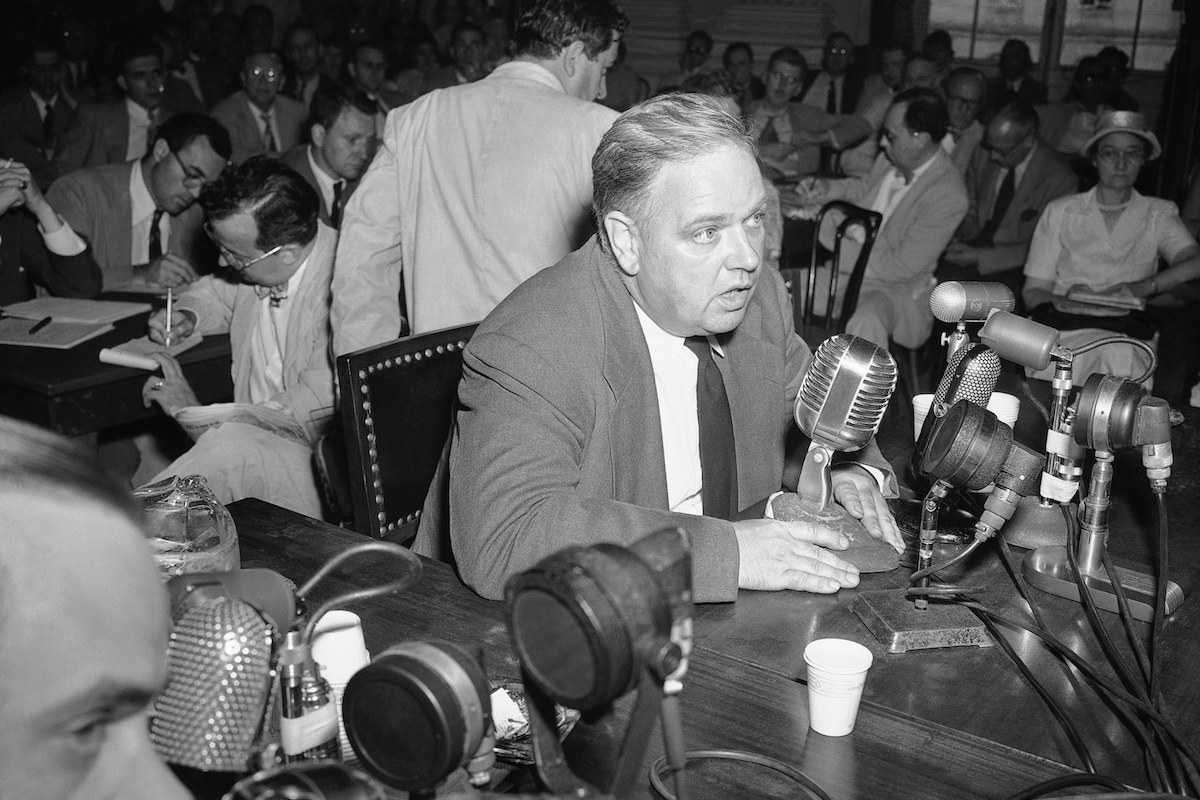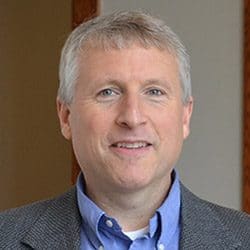It was 70 years ago, 1952, that Whittaker Chambers published his memoir, Witness. It was a bestseller with a major impact, including on a future president who, more than any other figure, defeated the country that Chambers once served, winning the Cold War.
Chambers exploded onto the national scene courtesy of his dramatic 1948 trial when he squared off with Alger Hiss in one of the most important cases of the 20th century. Americans were riveted, given the gravity of the charges: espionage. The memoir that followed (published by Random House) was a gripping, beautifully written work, in which Chambers not only recounted the high stakes but the captivating and often sordid details of his most unusual life. His autobiography made clear, too, that he was a witness not just in the Hiss trial and this Cold War epic but to much more.
Whittaker Chambers was born April 1, 1901, and given the odd name “Jay Vivian” by a very unstable mother. An awkward boy and man, he nevertheless grew up to become present to many historical events, often unwittingly. Arthur M. Schlesinger Jr. observed that Chambers “seemed at once to enjoy and to resent the burdens of history.”
One burden of history that Chambers bore was a perilous one. At Columbia University in the early 1920s, he took up the torch of Karl Marx, becoming a hardcore communist. Sam Tanenhaus, in his superb 1997 biography, said that in joining the communist cause, Chambers “had at last found his church.” The Marxist faith gave Chambers purpose and meaning.
But it was a dangerous and perverse purpose and meaning, and Chambers made it worse by joining the dark side in a deep way. From 1932 to 1938, Chambers became a Soviet spy, conspiring with (among other characters) a high-level State Department official with whom he helped pilfer documents for Moscow: Alger Hiss (1904–1997). Hiss was in many ways everything Chambers was not—charming, smooth, socially connected. He was a darling of the eastern liberal elite, with sterling credentials among the foreign policy establishment, at one point heading up the prestigious Carnegie Endowment for International Peace in Washington. He had clerked for Oliver Wendell Holmes, attended Yalta with FDR’s delegation, and was present at the creation of the United Nations.
In dramatic exchanges during the 1948 trial, Chambers identified Hiss as “the concealed enemy” that all freedom-loving Americans were fighting against. Hiss denied everything, including even knowing Chambers. Hiss nonetheless was unanimously convicted of perjury and spent 44 months in federal prison in Lewisburg, Pennsylvania. Hiss later quipped that his nearly four years in prison was a good corrective to four years at Harvard. Until the day he died, Hiss claimed innocence. But he was certainly guilty, as Chambers showed in his testimony and his memoir.
Chambers shared details of the Hiss trial and the larger trials of his tormented life in Witness. The book made clear that he was a learned, highly intellectual, and a deep thinker so often anguished. Chambers for a long time was unhealthy, physically and emotionally, suffering several heart attacks and still dealing with scars going back to childhood, having grown up in a big-city home of severe family dysfunction.
The succinct title, Witness, is clever. Yes, Chambers became famous as a witness in the Hiss trial, but he was in fact a witness to much more. Perhaps unexpected to readers, Chambers showed that he had served as another kind of witness—as Christians understand the word “witness.” The Greek word for witness is “martyr.” Chambers ultimately saw himself as a kind of martyr as well. “I only knew that I had promised God my life, even, if it were His will, to death,” he wrote solemnly in Witness. “This is my ultimate witness.”
Chambers hooked readers right away with a fascinating opening essay, which he titled, “Foreword in the Form of a Letter to My Children.” The foreword can stand apart on its own, and in fact often does when reprinted in various edited collections of classic conservative anthologies. Here Chambers stated it was his “fate” to be a “witness” to each of the “two great faiths of our time.” He wrote: “For in this century, within the next decades, will be decided for generations whether all mankind is to become Communist, whether the whole world is to become free, or whether, in the struggle, civilization as we know it is to be completely destroyed or completely changed. … It is our fate to live upon that turning point in history.”
It was a turning point that hinged on the battle of good vs. evil.
Chambers went on to state candidly that “I see in communism the focus of the concentrated evil of our time.” This is hauntingly similar to President Ronald Reagan’s Evil Empire speech given some 30 years later, during which Reagan called the USSR “the focus of evil in the modern world.” That is no surprise, given that no other book (with the exception of the Bible) influenced Reagan as much as Witness did. The 40th president kept an extra copy of Witness on a bookshelf at his ranch in the Santa Ynez mountains, in addition to a copy at his home in Los Angeles.
Like Reagan, Chambers frequently employed the word “evil” to describe Soviet communism. “Communism is absolutely evil,” he declared in Witness. “It was communism that was evil, and the more truly a man acted in its spirit and interest, the more certainly he perpetuated evil.” As a communist, he had to come to grips with this. “I denied the very existence of a soul,” he shared. “Communism denies the soul.” At one point, he finally acknowledged to himself: “This is evil, absolute evil. Of this evil I am a part.”
It is here that Chambers rightly saw that the battle against communism was not merely about politics and economics. He liked the quote from Dostoyevsky: “The problem of Communism is not an economic problem. The problem of Communism is the problem of atheism.” (Arthur Schlesinger Jr. noted insightfully that Chambers seemed to see himself as a character out of Dostoyevsky.)
Regarding communism, Chambers continued: “It is not new. It is, in fact, man’s second oldest faith. Its promise was whispered in the first days of the Creation under the Tree of the Knowledge of Good and Evil: ‘Ye shall be as gods.’” He affirmed that “the Communist vision is the vision of Man without God.”
Chambers ended his foreword by evoking Golgotha, the “place of skulls.” But later he speaks of redemption, his own, by evoking Lazarus. “In 1937, I began, like Lazarus, the impossible return.”
Chambers gave 1938 as the year of his break, when he “freely made the choice—the decision to die, if necessary, rather than live under communism.” Writing almost like a mystic, he recalled being struck one day by almost audible words spoken to him: “If you will fight for freedom, all will be well with you.” He conceded that he was not sure if he heardthose actual words, but he certainly felt them. “What was there,” recalled Chambers, “was the sense that, like me, time and the world stood still, an awareness of God as an envelopment, holding me in silent assurance and untroubled peace.” He made his commitment: “There was a sense that in that moment I gave my promise, not with the mind, but with my whole being, and that this was a covenant that I might not break.”
Henceforth he began to feel a sense of peace and strength. It is only in God’s will, wrote Dante, that we can find our purpose and our peace. That was where Chambers had at last arrived. He told readers: “I did not seek to know God’s will. I did not suppose that anyone could know God’s will. I only sought prayerfully to know and to do God’s purpose with me.”
There is so much more that one could say about the stirring content in the pages of Witness, but space here limits us. I will share one particularly moving passage that also hit Ronald Reagan and remained with him. Reagan could quote it off the top of his head. Reagan speechwriters have told me about Reagan doing so, and they and he included the passage in his speeches. Here is the passage in Chambers’ memoirs:
I date my break [from communism] from a very casual happening. I was sitting in our apartment on St. Paul Street in Baltimore…. My daughter was in her high chair. I was watching her eat. She was the most miraculous thing that had ever happened in my life. I liked to watch her even when she smeared porridge on her face or dropped it meditatively on the floor. My eye came to rest on the delicate convolutions of her ear—those intricate, perfect ears. The thought passed through my mind: “No, those ears were not created by any chance coming together of atoms in nature (the Communist view). They could have been created only by immense design.” The thought was involuntary and unwanted. I crowded it out of my mind. But I never wholly forgot it or the occasion. I had to crowd it out of my mind. If I had completed it, I should have had to say: Design presupposes God. I did not then know that, at that moment, the finger of God was first laid upon my forehead.
If readers will further indulge me as a Reagan biographer, I would like to conclude with a final point of comparison between Whittaker Chambers and Ronald Reagan, because it gets to the crux of how the Cold War was won by the latter. It also underscores why Chambers’ dramatic message in Witness was so stirring and enduring.
If there was one monumental difference between Chambers and Reagan, it was this: Chambers was a pessimist, whereas Reagan was the quintessential optimist. Reagan was imbued with an intense sense of divine providence and an unwavering conviction that he could work according to God’s “Divine Plan” (as Reagan put it) to change the world for the better.
Chambers somberly feared that, although he had joined the right side by rejecting Soviet communism, he had left “the winning side for the losing side.” He feared that the side of freedom—America—would lose. Ronald Reagan believed precisely the opposite. He felt the United States would win. As he told one of his advisers (Richard Allen), “We win, they lose.” Reagan was so sure of it that, as president, he sought precisely to achieve that goal. And what happened? We won, they lost.
Reagan was right, and Chambers was wrong. If only the morose martyr, who passed away on July 9, 1961, from yet another heart attack, had lived long enough to witness it.

